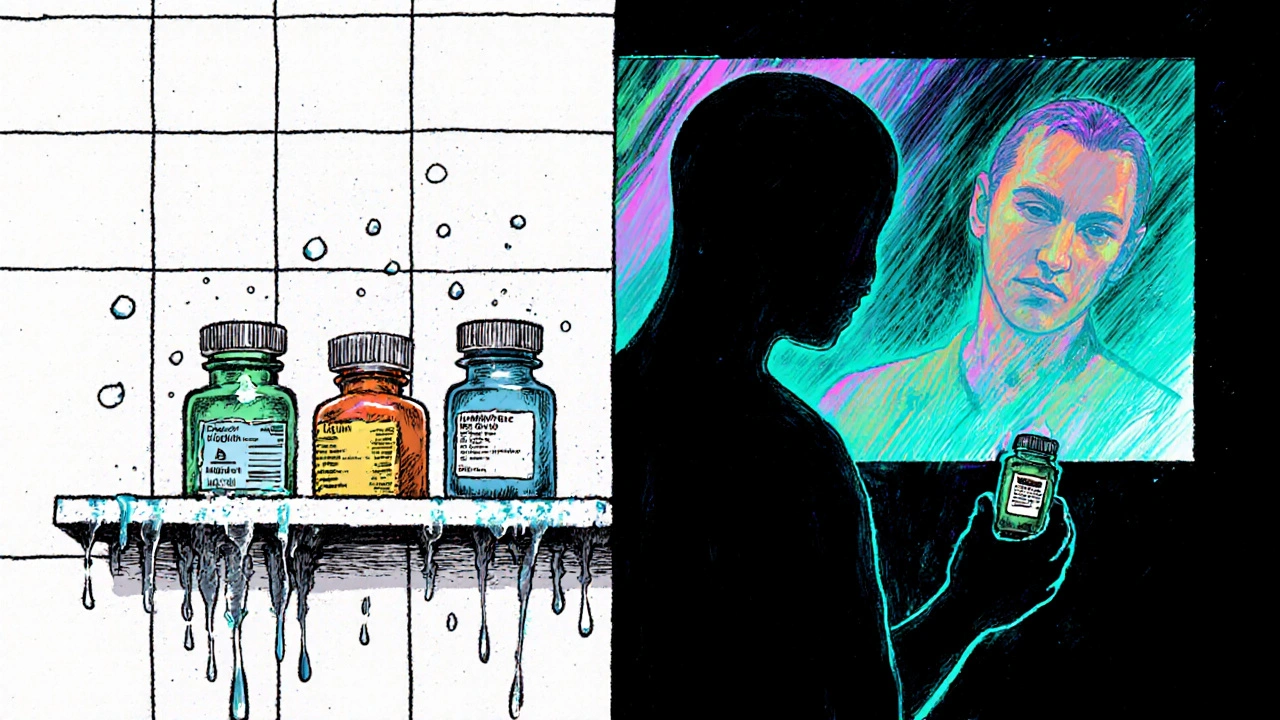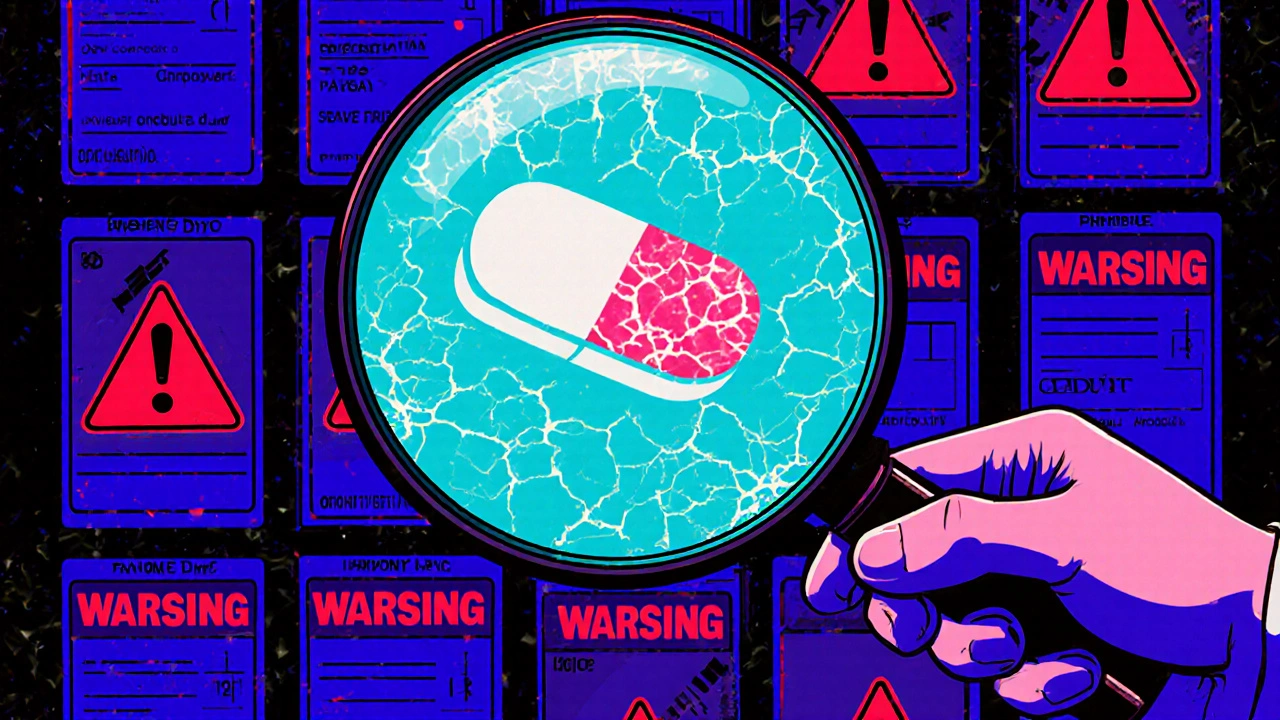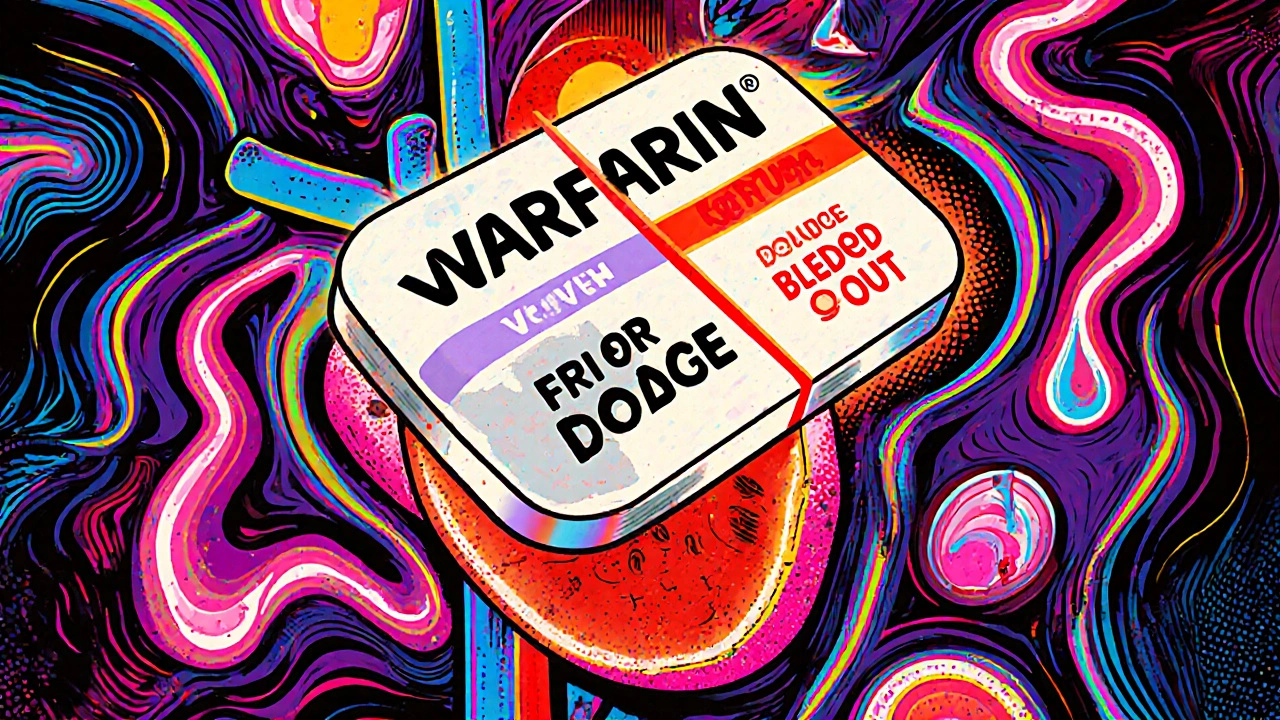When you take a pill, you assume it works exactly as it should. But for some medications, even a tiny change in strength can be dangerous - even deadly. These are called narrow therapeutic index (NTI) drugs. They’re not rare. In fact, they’re used daily by hundreds of thousands of people. And if they’re expired, the risk isn’t just theoretical. It’s real, and it’s life-threatening.
What Exactly Is a Narrow Therapeutic Index?
A narrow therapeutic index means there’s almost no room for error. The difference between a dose that works and a dose that harms is razor-thin. For example, with warfarin - a blood thinner - a 10% drop in potency might mean your blood won’t thin enough, leading to a stroke or pulmonary embolism. A 10% increase? You could bleed internally without warning.
The FDA defines NTI drugs as those where small changes in blood concentration can cause serious side effects - like organ failure, seizures, or death. These aren’t just strong drugs. They’re precise drugs. Think of them like a scalpel, not a hammer. Too little, and the job isn’t done. Too much, and you cause irreversible damage.
Common NTI drugs include:
- Warfarin (blood thinner)
- Lithium (for bipolar disorder)
- Digoxin (for heart failure)
- Phenytoin (for seizures)
- Levothyroxine (for thyroid disease)
- Carbamazepine (for epilepsy and nerve pain)
- Ciclosporin (for transplant patients)
Each of these has a narrow window where it’s safe and effective. Digoxin, for example, works between 0.5 and 0.9 nanograms per milliliter in the blood. Above 1.2, you’re in toxic territory. That’s less than a 33% margin. No other class of medication operates like this.
Why Expiration Dates Are Critical for NTI Drugs
You’ve probably heard that most pills are still safe to take after their expiration date. The FDA even says many retain 90% potency for years beyond the label. That’s true for painkillers, antihistamines, or antibiotics like amoxicillin. But it’s not true for NTI drugs.
Here’s why: if a warfarin tablet loses just 5% of its potency after expiration, that’s a 45% deviation from the FDA’s strict bioequivalence standard for NTI drugs (which allows only ±11% variation). That’s not a small change. That’s enough to push a patient out of the safe range.
And it’s not just about losing strength. Some drugs break down into harmful substances. Tetracycline, for instance, can turn toxic when expired - though it’s not an NTI drug, it shows how degradation isn’t always predictable. For NTI drugs, you don’t get a second chance. A small chemical shift could mean the difference between life and death.
Levothyroxine, used for hypothyroidism, is especially sensitive. Even slight changes in absorption can cause symptoms like fatigue, weight gain, or heart palpitations. If the tablet degrades slightly, your body won’t get the exact dose your thyroid needs. Your doctor can’t adjust for that unless they know the pill’s potency has changed - and they can’t know if it’s expired.
What Happens When You Take an Expired NTI Drug?
There’s no lab test you can run at home to check if your lithium or digoxin is still good. You won’t feel it right away. But over days or weeks, the effects creep in.
For someone on warfarin:
- Too little → INR drops below 2.0 → risk of blood clots
- Too much → INR rises above 4.0 → risk of brain bleed
For someone on lithium:
- Too little → depression returns, suicidal thoughts
- Too much → tremors, confusion, kidney damage, coma
A 2014 study in the Journal of Clinical Pharmacy and Therapeutics found that drug-related problems with NTI medications were far more likely to result in hospitalization than other drugs. And while no study directly tracks expired NTI drugs, the evidence is clear: when potency changes, outcomes change - often for the worse.
One real-world example: a 68-year-old man on digoxin after a heart attack took pills from a 2-year-old bottle. His levels dropped. He developed atrial fibrillation. He ended up in the ER. His doctor later found the pills had been stored in a humid bathroom - a known risk for degradation.

How to Handle NTI Medications Safely
There are no gray areas here. If your NTI medication is expired, throw it away. Don’t guess. Don’t risk it.
Here’s what to do instead:
- Check expiration dates monthly. Set a phone reminder for the first of every month to review your NTI meds.
- Store them properly. Keep them in a cool, dry place - not the bathroom or near the stove. Heat and moisture destroy potency faster.
- Don’t refill early. If your prescription runs out, get a new one. Don’t use leftovers from last year.
- Ask your pharmacist. If you’re unsure, call. Pharmacists know which NTI drugs are most sensitive. They can tell you if a batch has special storage needs.
- Use one pharmacy. Sticking with one pharmacy helps them track your meds and spot potential interactions or substitutions.
Also, never switch brands or generics without talking to your doctor. Even FDA-approved generics of NTI drugs can behave differently in your body. That’s why the FDA requires tighter testing for them - and why your doctor might insist you stay on the same brand.
What Providers Should Do
Doctors and pharmacists treat NTI drugs as high-alert medications. That means double-checking prescriptions, verifying doses, and counseling patients on storage and expiration.
The Institute for Safe Medication Practices recommends:
- Labeling NTI prescriptions with a red flag or sticker
- Verifying the patient understands the risks of expired meds
- Using electronic alerts when an NTI drug is refilled after expiration
- Providing written instructions on storage and disposal
Many hospitals now use barcode scanning to ensure the exact brand and lot number are given to patients on NTI drugs. That’s because even small differences between manufacturers can affect absorption.
And while the FDA doesn’t yet have official rules on expiration for NTI drugs, they’ve made it clear: bioequivalence standards for these drugs are stricter than for any other class. That’s because they know how dangerous even minor changes can be.

What’s Being Done - and What’s Not
The FDA has pushed for better testing of NTI drugs since 2011. They now require replicate bioequivalence studies for drugs like tacrolimus and phenytoin, ensuring generic versions match the brand within ±11% - not the usual ±25%.
Some manufacturers are going further. A 2022 survey found 78% of major drugmakers now test NTI drugs beyond their labeled expiration dates to understand how they degrade. That’s good. But it doesn’t help you if your bottle says 2023 and you’re taking it in 2025.
Professional groups like the American Pharmacists Association are calling for special labeling on NTI drugs - like “Do Not Use After Expiration” or “Store in Original Container.” Right now, they’re not required.
And here’s the gap: no clinical studies have looked at what happens when patients take expired NTI drugs. We’re relying on chemistry, pharmacology, and real-world cases to warn people. That’s not enough. But it’s what we have.
Bottom Line: When It Comes to NTI Drugs, Don’t Take Chances
You wouldn’t drive a car with worn brakes and hope for the best. You wouldn’t fly on a plane with an expired oxygen mask. So why take a pill that could kill you because you didn’t want to pay $10 for a refill?
NTI drugs aren’t like your multivitamin or ibuprofen. They’re precision tools. And like any precision tool, they need to be fresh, properly stored, and used exactly as intended.
If you take one of these drugs, treat it like your life depends on it - because it does.
Can I still take my warfarin if it expired six months ago?
No. Warfarin is a narrow therapeutic index drug. Even a 5% loss in potency can push your INR out of the safe range, increasing your risk of stroke or dangerous bleeding. Never use expired warfarin. Get a new prescription.
Do all expired medications become dangerous?
No. Most common drugs like acetaminophen or antihistamines remain safe and effective for years past their expiration date. But NTI drugs - like lithium, digoxin, and phenytoin - are an exception. Their narrow safety window makes even small changes in potency risky. Don’t assume all expired meds are the same.
Can I split a tablet to adjust the dose if the expiration date passed?
Never split NTI medications unless your doctor or pharmacist specifically says it’s safe. Splitting can cause uneven distribution of the active ingredient, especially if the tablet has degraded. Even if it looks fine, you can’t tell if the potency is still accurate. Use a new, unexpired pill.
Why do some pharmacies refill NTI drugs more frequently?
Because these drugs require tight control. Refilling every 30 days instead of 90 helps ensure patients aren’t taking old or degraded medication. It also gives pharmacists more chances to check for drug interactions, monitor side effects, and confirm the patient is taking the right dose.
Is it safe to store NTI drugs in a pill organizer?
Only if the organizer is kept in a cool, dry place and used for less than a week. Long-term storage in plastic organizers exposes pills to air and moisture, which can degrade potency - especially for NTI drugs. Keep them in their original bottles until you’re ready to take them.
What should I do with expired NTI medications?
Don’t flush them or throw them in the trash. Take them to a pharmacy drop-off program or a DEA-authorized collector. Many pharmacies offer free disposal for expired or unwanted medications. This keeps them out of water supplies and prevents accidental use by others.
If you're unsure about any medication you're taking - especially if it's for heart, thyroid, seizure, or mental health - talk to your doctor or pharmacist. Don’t wait until something goes wrong. With NTI drugs, prevention is the only safe option.

Kimberley Chronicle
November 25, 2025 AT 00:48As a clinical pharmacist, I can't stress enough how critical NTI drug stability is-especially with levothyroxine. Even minor humidity exposure can alter dissolution kinetics, leading to subtherapeutic serum concentrations. The FDA's ±11% bioequivalence threshold isn't arbitrary; it's rooted in pharmacokinetic modeling of thyroxine-binding globulin saturation curves. If your script's expired, don't gamble-get a new batch. Your TSH doesn't lie.
Shirou Spade
November 25, 2025 AT 01:00It's funny how we treat medicine like a machine-exact, predictable, unchanging. But the body isn't a machine. It's a river. And NTI drugs? They're like trying to steer a canoe with a broken paddle. You think you're holding course, but the current shifts under you. Expiration dates aren't just bureaucracy-they're the last guardrail before the fall.
Lisa Odence
November 25, 2025 AT 07:16OMG THIS IS SO IMPORTANT!!! 😭 I literally had my mom take expired digoxin last year because she 'didn't want to waste it' and now she's on a cardiac monitor 24/7 😫 I'm so mad at the pharma industry for not putting BIG RED STICKERS on these bottles like 'DO NOT USE AFTER DATE OR YOU WILL DIE' 🚨💉 I mean, come ON!! We label milk cartons better than this!!! And why isn't this on the news??!? This is a public health crisis!! 🤯🩺 #NTI #MedicationSafety #DontBeLikeMyMom
Ellen Sales
November 26, 2025 AT 21:37I’ve been managing my bipolar disorder on lithium for 17 years and I’ve never once taken a pill past its date-not even by a day. I know people say 'it's probably fine' but you know what’s not fine? Waking up with your hands shaking so bad you can’t hold a coffee cup because your serum level spiked to 1.5 because some lab batch degraded in a hot warehouse. I’ve been there. I don’t need to go back. I refill monthly. I store mine in a sealed glass jar in the bedroom closet. I don’t trust pharmacies to know what’s in their back rooms. I don’t trust the weather. I don’t trust luck. I trust my own discipline. And if you’re on this stuff? You should too.
giselle kate
November 27, 2025 AT 22:04Of course the FDA lets this happen. They’re in bed with Big Pharma. Why would they want you to replace your meds every 30 days? That’s profit. They want you to hoard pills, take expired junk, and then pay for ER visits later. Meanwhile, the real solution? Ban generics for NTI drugs. Let only the brand-name stuff be sold. That’s what they do in Europe. But here? We’re lab rats for corporate greed. And you’re just sitting there trusting a sticker on a bottle. Wake up.
Leisha Haynes
November 28, 2025 AT 17:43Timothy Sadleir
November 28, 2025 AT 23:44Let’s be clear: the expiration date is not a legal requirement-it’s a liability shield. The real issue is that the FDA allows generic NTI drugs to be manufactured by 12 different companies, each with different excipients, each with different dissolution profiles. That’s not medicine-that’s Russian roulette with pharmacokinetics. And don’t get me started on how pharmacies substitute brands without telling you. Your doctor doesn’t know. You don’t know. But your INR does. And it’s screaming.
Roscoe Howard
November 30, 2025 AT 17:37It's not just about potency. It's about consistency. The body adapts. You're not just dosing a chemical-you're tuning a biological system. When you introduce a degraded NTI drug, you're introducing noise into a system calibrated over months. That's why patients on warfarin get INR swings after switching brands or using old stock. It's not the drug failing-it's the system being destabilized. And that's why we need standardized, single-source, traceable NTI formulations. Not generics. Not bulk bins. Not bathroom storage. Precision medicine demands precision supply chains.
Agastya Shukla
December 1, 2025 AT 09:42From a pharmacokinetic standpoint, NTI drugs are uniquely vulnerable to polymorphic metabolism-CYP2C9 variants for warfarin, CYP3A4 for cyclosporin. Degradation products may inhibit or induce these enzymes unpredictably. A 5% loss in parent compound doesn't just reduce efficacy-it can create metabolites with off-target effects. We've seen this with carbamazepine epoxides in elderly patients. The expiration date isn't a suggestion-it's the last validated point in the drug's metabolic stability curve. Beyond that, you're entering a pharmacological black box.